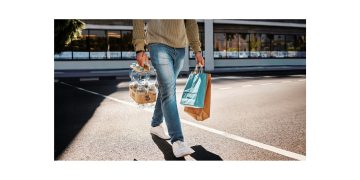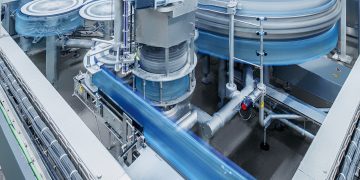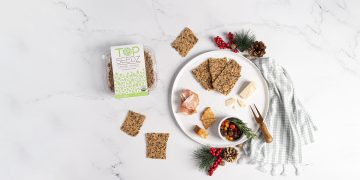Under the effects of the COVID-19 pandemic, hygiene and health shape consumers’ perception and actions. However, sustainable products with resource-friendly production remain important to people, as well.
In a study by the Fraunhofer Institute ISI in Karlsruhe on the fifty trends influencing Europe’s food sector by 2035, approximately fifteen of them are closely connected to sustainability. According to this study, “sustainable production and value chains” save between €280 and €470 billion a year. The Institute also considers “strict waste legislation” to be an influencing factor in the future development of the sector. The waste legislation of the European Union currently demands that manufacturers must intensify recycling and re-use of recycled material for packaging in future.
Questions of sustainability are already an integral part of the world of food and beverage manufacturing – with consumers also demanding solutions. According to a study by market research group Mintel, 44% of US-American millennials say that environmentally friendly brands best portray the personal values of their generation. The key players in the industry see two starting points. One is a direct approach: How can the manufacturing of beverages and liquid food be made sustainable? The other is an indirect approach: How can the packaging and selling of these products make it as simple as possible for the consumers themselves to regularly protect the environment.
Raw materials as a starting point for sustainability
There are many options for beverage manufacturers who are looking for a starting point to produce environmentally efficient products. The first key: certified raw material. For drinks manufacturing, certifications indicate the sustainable and fair cultivation of basic and raw materials. Manufacturers take part in initiatives such as Fairtrade, the Rainforest Alliance and UTZ, and with the certification of their raw materials they back platforms such as SAI/FSA (Sustainable Agriculture Initiative / Farm Sustainability Assessment).
For example, with sustainable and monitored hops, nearly any brewery can take their first step as early as the raw material procurement stage. Suppliers of flavors and ingredients also have certified products in their portfolio that, in the case of NFC products (not from concentrate) for example, guarantee a natural and pristine taste experience.
Shifts in the supply chain are also an unmistakable sign that sustainability solutions close to manufacturing – and, with them, reductions in CO2 – are on the rise in the beverage industry, allowing for less transport along with more environmental protection. The Budweiser Brewing Group, for example, reports that its production sites in Great Britain get up to 100% of their malt from UK sources. To this end, the brewing group works closely with farmers and retail partners that have introduced a new type of grain specific to the requirements of the United Kingdom.
Of course, the industry must think beyond its own applications. One successful example of this open-ended way of thinking is the use of beer draft in food manufacturing. Waste material from beer manufacturing can be used in muesli, flour, chips or even men’s cosmetics.
Process optimization to save resources and energy
A second starting point in beverage production is the creation of sustainable processes. Energy-efficient processes and cycle concepts can save resources and energy in beverage manufacturing. The water footprint is an important indicator of documenting frugal water usage in beverage production. Breweries in particular are working intensively to keep the amount of water used at a low level. A key term is waste water recycling. Using water treatment such as ultrafiltration and reverse osmosis can reduce water consumption in beverage operations by up to 80%. The Danish brewer Carlsberg has demonstrated this by opening a water treatment system at its Fredericia site. Consequently, the average water consumption is expected to fall from 2.9 hectoliters per hectoliter of beer to 1.4 hectoliters.
Main topic: sustainable packaging
While the brewing process offers a lot of opportunity to optimize energy efficiency, the manufacturers of non-alcoholic soft drinks often focus on the sustainability potential of packaging. In light of the EU Plastics Directive , there is a need to significantly curb the volume of packaging waste. This also applies to food manufacturers and the beverage industry. A question on which all manufacturers in the beverage industry are focusing is, “how can the use of plastic be minimized?” Depending on the specifications of the bottler, the bottle design can be created using individual Virgin PET/recycled material mixtures. Bottle-to-bottle recycling systems with modules for the washing or decontamination process prepare used PET bottles for renewed use in food and beverage applications. Asahi Beverages is an example of how the availability of raw material PET is becoming more and more interesting to beverage manufacturers. The company is taking part in a joint venture to create a recycling system for PET in Australia with a recycling capacity of one billion 600-ml PET bottles a year and an annual production of 20,000 tons recycled material. The value of the total investment is around $45 million.
In light of this competition, how can alternative plastics take hold in the market? Bio PET as a blend, based on the residual material from sugar cane or sugarbeet production, already sees a lot of use. According to the Institute for Bioplastics and Biocomposites at Hannover University , the global production capacity for this material will increase from 1.4 million tons (2018) to 2.2 million tons by 2023 by changing the strategies of large soft drinks manufacturers.
Another exciting question to ponder is what significance new plastic variations, like the platform chemical FDCA (furandicarboxylic acid) for the plastic PEF (polyethylene furanoate) , will take on. This makes available materials created using renewable raw materials derived from residual agricultural industry materials or wood waste, and demonstrates significantly improved barrier properties compared to traditional PET. At the same time, plastic alternatives are also gaining awareness on the beverage market. The innovative power of the industry is already evident in bottle variants made of paper and an inner layer of foil made of bioplastic that is to be used for the likes of spirits.
Machine manufacturers are also opening up new opportunities for paper as a packaging material for secondary packaging: Why not wrap a can tray with paper? Or equip a six-pack of PET mineral water with a cardboard grip and eliminate the wrap-around sheet covering altogether?
Sustainability is still a hot topic
Even fundamental discussions remain relevant: Has recycling design been learned? What effect does the EU tax on non-recycled plastic waste have on the beverage industry? How will the environmental balance of packaging change if plastic is replaced with paper? And last but not least, what role can chemical recycling play in this situation?
The world’s leading trade fair, drinktec, has its finger on the pulse by putting this topic in a top position as the future direction of the industry. In Munich, from October 4 to 8, 2021, drinktec will offer a comprehensive information platform on the focal point of the future, sustainability in the beverage industry.




















